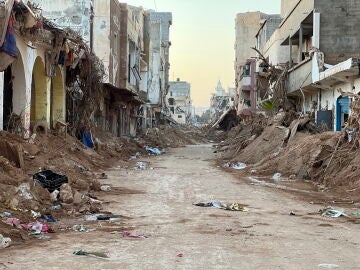
The home of the former mayor of the Libyan city of Derna, devastated by Cyclone Daniel a week earlier, It was burned by dozens of citizens during the protests against the management of local authorities, as reported by a local source.
The former head, Abdulmenam Al Gaizi, was suspended days before by the Benghazi Government (this) waiting to conclude a judicial investigation into the disaster that occurred in this town, in which it is estimated that 11,300 people died and another 10,000 disappeared. Al Gaizi had stated that the death toll could reach 20,000.
Shouting “Libya, national unity. East or West. Libyans are brothers and there are no differences between anyone“Thousands of residents gathered in the central Martyrs’ Square and called for the dismissal of the president of Parliament, Aquila Salah, whom they accuse of hindering the country’s unification process after twelve years of conflict following the popular uprising backed by NATO. who overthrew Muammar Gaddafi.
According to critics, the House of Representatives, located in Tobruk, did not meet until three days after torrential waters devastated the northeast of the country last Sunday, especially Derna, where two dams collapsed, pouring 33 million of liters of water during the early hours of the morning and washing entire residential areas, bridges and roads into the sea. The tension in this coastal town, which had 120,000 inhabitants, occurred hours after the United Nations drastically revised downwards the number of victims of the cyclone, from 11,300 to 4,000.
For his part, the acting head of the Derna municipal council, Ahmed Amdrud, announced three measures to address the situation: the reconstruction of the city by specialized foreign companies, the hiring of consultants to determine the viability of the dams and offer a housing subsidy to the victims.
The preliminary results of the investigation opened this Thursday by the Prosecutor’s Office about this collapse would reveal human failures after the appearance of the first cracks in 1999 and the lack of maintenance for decades, which would have drastically reduced the number of victims according to the UN.
Meanwhile, survivors and local and international rescue teams continue the search for bodies, located mostly in the areasand another 40,000 people have been displaced and face outbreaks of diseases such as cholera and diarrhea, as well as dehydration and malnutrition due to water contamination and poor hygiene.
The management of the disaster has been marked by political division and the lack of coordination between the two opposing authorities that are vying for executive power: the Government of National Unity (GNU), based in Tripoli (west) and recognized by the international community, by Abdulhamid Dbeiba; and the Benghazi Government, elected by Parliament and under Haftar’s control, led by Osama Hammad.
Source: Lasexta
Ricardo is a renowned author and journalist, known for his exceptional writing on top-news stories. He currently works as a writer at the 247 News Agency, where he is known for his ability to deliver breaking news and insightful analysis on the most pressing issues of the day.












